So I ran 9.3 miles along a beautiful course with bands playing, crowds cheering, boom boxes booming and water everywhere. The Boilermaker had the best supply of water stops.
I came to the end. Thought I saw Neil, smiled and waved to a gray haired, gray bearded man who never saw me before.
Then I funneled through the finish line. One hour, thirty-eight minutes and fifty-five seconds. Not great, but still considered locally competitive for my age and gender.
They funneled me into the biggest gridlock of my life—bigger than the NYC marathon, bigger than Patterson’s government. (And Patterson was part of the problem here, as well.)
I walked along streets crowded with finishers and discovered plenty of water, but the Sobe vitamin water was gone, the good soda—gone, the Greek yogurt—gone. Boxes of quartered oranges still lay—many of them with the eaten oranges tossed in with the uneaten. Oh—to be at the end of the pack is not a pretty thing.
My hip buzzed.
Neil called. He may not have been the lovely gent I waved to, but he was somewhere near him. He saw me cross the finish line, and a picture he snapped would show me looking his way, grinning at some handsome man.
He had a dilemma (aside from not being able to hear me over the din). The cops and race marshals wouldn’t let him pass the barriers. He couldn’t get to me.
I yelled into my phone. He yelled into his. Somehow I understood only that he couldn’t get to me. I’d just get my lunch and find him.
Finding lunch proved hard as throngs swarmed the Price Chopper truck for our lunches. I grabbed one, found a tree, sat under it and munched a banana.
My hip beeped.
The phone never rang.
My husband still couldn’t find me.
“I’ll find you,” I yelled.
“What?”
“I’LL FIND YOU!!!!!”
“WHAT?”
I hung up the phone.
As I backtracked I discovered the rest of the food. With my arms pinned to my sides and shoulder to shoulder with about a billion other runners (and non-runners grubbing the food), I gathered a few more munitions, found a quiet road and rejoiced. No crowds. I turned a corner. Fewer people on this residential street. Porta Potties lay ahead and the Celtic Minstrel. Two landmarks. I’d call Neil. We’d meet there.
Of course he didn’t hear me.
“STAY WHERE YOU ARE. I’LL FIND YOU!!!!!!”
I lied.
As I approached orange fence blocking the entrance to the finish line, a cop stopped me.
“You can’t go through. Governor Patterson’s leaving.”
A couple behind me became incredulous. “I’ve got to find my daughter.”
“Sorry. The governor’s coming.”
“You mean I can’t get my daughter?”
“That’s right.”
I didn’t try to argue. I turned around and headed back to the mob. Before I reached it, Neil called.
“I’m behind the Price Chopper truck.”
“I know where that is. Stay there.” I flipped my cell shut. I’d find my husband. The right husband.
I got to the truck, but had one dilemma. I didn’t know where “behind” was. It all looked the same. Was it at the back, where the long side bordered the trees near the empty street I now backtracked on? Was it in front where all the other food courts lay, was it facing the family reunion or the street that funneled the runners in.
Only one solution since Neil couldn’t hear me. I walked around and around and around. Then, I caught sight of a good-looking, gray haired, gray bearded man with a cell phone stuck to his ear. Mine began buzzing once more. I trotted over, tapped Neil on the shoulder, startled him. He grabbed my hand and we attempted our escape.
The rest of our trip. Just ordinary.
It was a great run—but a lousy party. I’m glad I ran the Boilermaker, sorry I never met any of my training buddies there. Never even had the chance to get tempted with the free beer—if trying to get a sample of Greek yogurt had been a contortionist’s nightmare, can you picture the beer tent?
Thanks Governor Patterson. You even gridlock family reunions.

